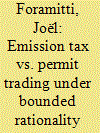| Srl | Item |
| 1 |
ID:
066287


|
|
|
| 2 |
ID:
176116


|
|
|
|
|
| Summary/Abstract |
A price on emissions can be achieved through an emission tax or permit trading. The advantages and drawbacks of either instrument are debated. We present an agent-based model to compare their performance under bounded rationality and dynamic markets. It describes firms that face uncertainty about future demand and prices; use heuristic rules to decide production levels, trading prices, and technology adoption; and are heterogeneous in terms of production factors, abatement costs, and trading behavior. Using multiple evaluation criteria and a wide range of parameter values, we find that the main difference between the two policies lies in the fact that permit prices fall after successful abatement. This can lead to higher production levels under permit trading, but can also drive emission-efficient firms out of the market. Scarcity rents under permit trading can further create higher profit rates for firms, the extent of which is shown to depend on the mechanisms for market-clearing and initial allocation.
|
|
|
|
|
|
|
|
|
|
|
|
|
|
|
|
| 3 |
ID:
162289


|
|
|
|
|
| Summary/Abstract |
The Brazilian government aims to increase the share of biofuels in the energy mix to around 18% by 2030, which implies an increase of ethanol production from currently 27 bln liters to over 50 bln liters per year. Biofuel policies play an important role in ethanol production, consumption, and investment in processing capacity. Nevertheless, a clear understanding of how current policies affect the evolution of the market is lacking. We developed a spatially-explicit agent-based model to analyze the impact of different blend mandates and taxes levied on gasoline, hydrous, and anhydrous ethanol on investment in processing capacity and on production and consumption of ethanol. The model uses land use projections by the PCRaster Land Use Change model and incorporates the institutions governing the actors’ strategic decision making with regard to production and consumption of ethanol, and the institutions governing the interaction among actors. From the investigated mix of policy measures, we find that an increase of the gasoline tax leads to the highest increased investments in sugarcane processing capacity. We also find that a gasoline tax above 1.23 R$/l and a tax exemption for hydrous ethanol may lead to doubling the production of ethanol by 2030 (relative to 2016).
|
|
|
|
|
|
|
|
|
|
|
|
|
|
|
|
| 4 |
ID:
175266


|
|
|
|
|
| Summary/Abstract |
In light of the Swiss government's reduction targets for greenhouse gas (GHG) emissions under the Paris Agreement, this article investigates how and with which policy measures these reduction targets can be met for the Swiss residential building sector. The paper applies an agent-based building stock model to simulate the development of the Swiss residential building stock under three different policy scenarios. The scenario results until 2050 are compared against the reduction targets set by the Swiss government and with each other. The results indicate that while the current state of Swiss climate policy is effective in reducing energy demand and GHG emissions, it will not be enough to reach the ambitious emission-reduction targets. These targets can be reached only through an almost complete phase-out of fossil-fuel heating systems by 2050, which can be achieved through the introduction of further financial and/or regulatory measures. The results indicate that while financial measures such as an increase in the CO2 tax as well as subsidies are effective in speeding up the transition in the beginning, a complete phase-out of oil and gas by 2050 is reached only through additional regulatory measures such as a CO2 limit for new and existing buildings.
|
|
|
|
|
|
|
|
|
|
|
|
|
|
|
|